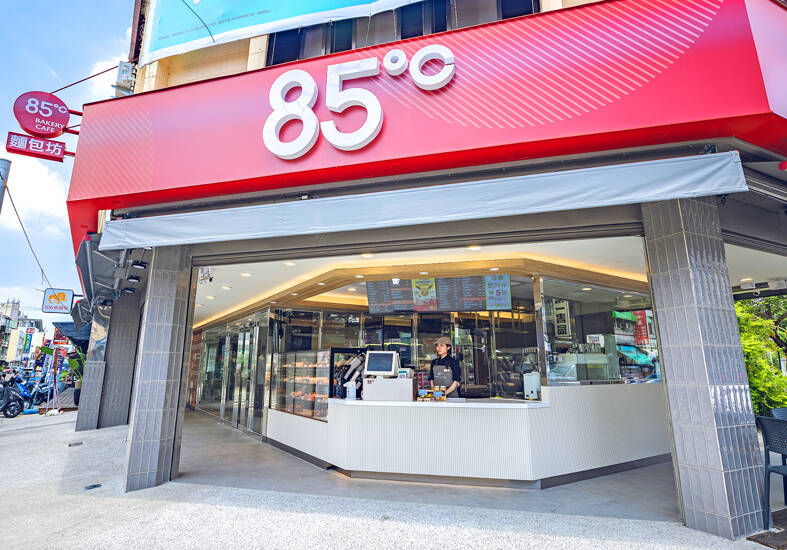Gourmet Master Co (美食達人), which operates cafe and bakery chain 85°C (85度C) in Taiwan and overseas, yesterday said it shut down 14 outlets in China last quarter to cope with the vast consumer market’s lackluster recovery in the post-COVID-19-pandemic era.
Gourmet Master sought to play down the move as normal business adjustments to keep its economic scale optimal, rather than massive closures or intentions to pull out of China, its largest source of revenue.
Revenue contributions from China grew 3 percent in the first three quarters of this year, although its overall share declined to 51 percent from a peak of 72 percent in 2014, it said.

Photo courtesy of Gourmet Master Co
“It is common for restaurant brands to adjust product lines and portfolios to strengthen operational efficiency in a competitive market such as China,” the company said.
Gourmet Master said it reviews the financial performance of every outlet on a quarterly basis.
The Chinese market lagged behind expectations after emerging from pandemic restrictions, but the company would not abandon the market it entered in 2007, it said.
As of September, Gourmet Master operated 440 stores in Taiwan, 71 in the US, six in Hong Kong and 575 in China.
Analysts said Gourmet Master might shut another 15 shops in China this quarter and stand by a cautious approach next year to improve its profitability.
Sales in China last month declined 5.8 percent year-on-year to NT$1.6 billion (US$50.88 million) but expanded by double-digit percentages in the US market, company data showed.
The figures indicated that operations in China have dragged on profits for the company, which said it had no expansion plans in the country while customers remain conservative about spending.
Net profit increased 38.62 percent year-on-year to NT$228.66 million during the July-to-September period, or earnings per share (EPS) of NT$1.27. Cumulative net profit in the first three quarters more than doubled to NT$741.28 million, or EPS of NT$4.12.
In contrast to China, Gourmet Master said it would open new stores in the US from this quarter, as operations there have a higher profit margin over its Chinese and Taiwanese operations.
Net profit for the US market last quarter rose 18 percent annually to NT$1.78 billion.
“That market still poses ample growth potential,” it said.

SEMICONDUCTORS: The German laser and plasma generator company will expand its local services as its specialized offerings support Taiwan’s semiconductor industries Trumpf SE + Co KG, a global leader in supplying laser technology and plasma generators used in chip production, is expanding its investments in Taiwan in an effort to deeply integrate into the global semiconductor supply chain in the pursuit of growth. The company, headquartered in Ditzingen, Germany, has invested significantly in a newly inaugurated regional technical center for plasma generators in Taoyuan, its latest expansion in Taiwan after being engaged in various industries for more than 25 years. The center, the first of its kind Trumpf built outside Germany, aims to serve customers from Taiwan, Japan, Southeast Asia and South Korea,

POWERING UP: PSUs for AI servers made up about 50% of Delta’s total server PSU revenue during the first three quarters of last year, the company said Power supply and electronic components maker Delta Electronics Inc (台達電) reported record-high revenue of NT$161.61 billion (US$5.11 billion) for last quarter and said it remains positive about this quarter. Last quarter’s figure was up 7.6 percent from the previous quarter and 41.51 percent higher than a year earlier, and largely in line with Yuanta Securities Investment Consulting Co’s (元大投顧) forecast of NT$160 billion. Delta’s annual revenue last year rose 31.76 percent year-on-year to NT$554.89 billion, also a record high for the company. Its strong performance reflected continued demand for high-performance power solutions and advanced liquid-cooling products used in artificial intelligence (AI) data centers,

Gasoline and diesel prices at domestic fuel stations are to fall NT$0.2 per liter this week, down for a second consecutive week, CPC Corp, Taiwan (台灣中油) and Formosa Petrochemical Corp (台塑石化) announced yesterday. Effective today, gasoline prices at CPC and Formosa stations are to drop to NT$26.4, NT$27.9 and NT$29.9 per liter for 92, 95 and 98-octane unleaded gasoline respectively, the companies said in separate statements. The price of premium diesel is to fall to NT$24.8 per liter at CPC stations and NT$24.6 at Formosa pumps, they said. The price adjustments came even as international crude oil prices rose last week, as traders

SIZE MATTERS: TSMC started phasing out 8-inch wafer production last year, while Samsung is more aggressively retiring 8-inch capacity, TrendForce said Chipmakers are expected to raise prices of 8-inch wafers by up to 20 percent this year on concern over supply constraints as major contract chipmakers Taiwan Semiconductor Manufacturing Co (TSMC, 台積電) and Samsung Electronics Co gradually retire less advanced wafer capacity, TrendForce Corp (集邦科技) said yesterday. It is the first significant across-the-board price hike since a global semiconductor correction in 2023, the Taipei-based market researcher said in a report. Global 8-inch wafer capacity slid 0.3 percent year-on-year last year, although 8-inch wafer prices still hovered at relatively stable levels throughout the year, TrendForce said. The downward trend is expected to continue this year,